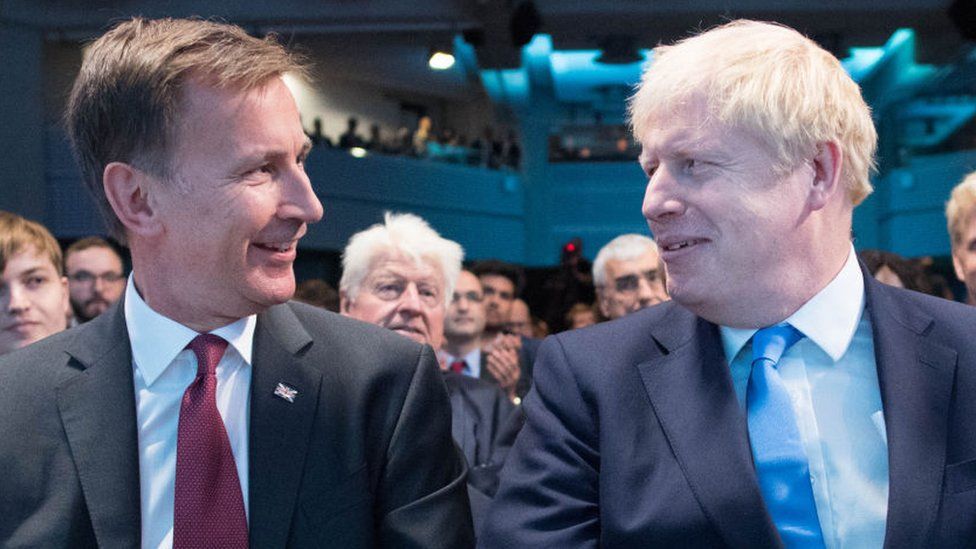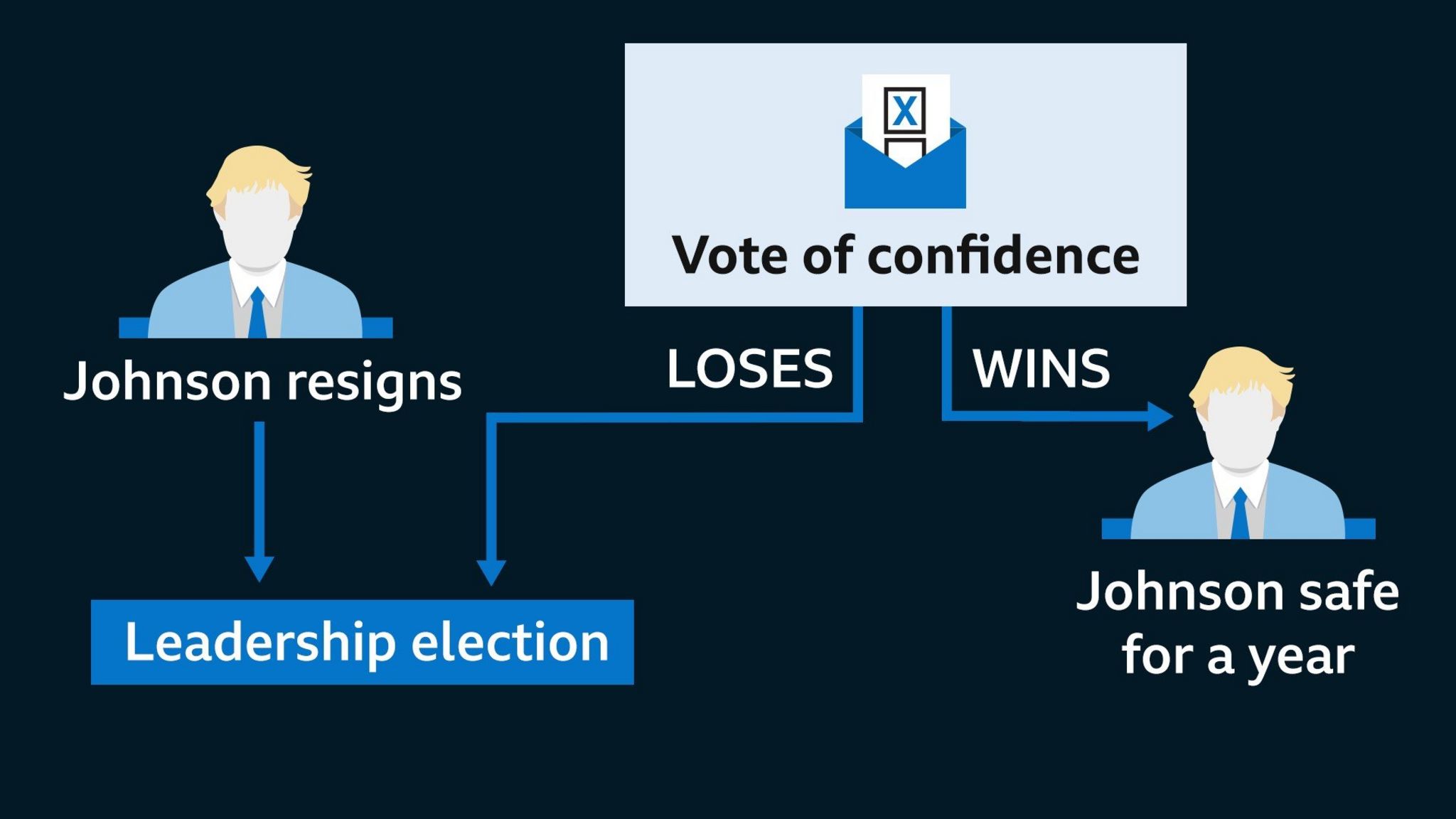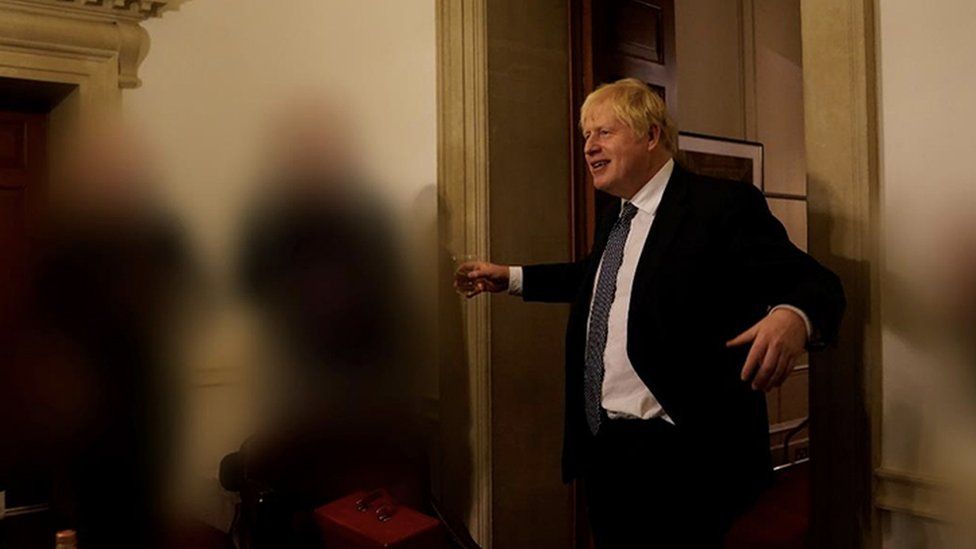This video can not be played
To play this video you need to enable JavaScript in your browser.
Boris Johnson has sought to rally his senior ministers at a cabinet meeting, after surviving a vote to oust him as Conservative Party leader.
He was backed by 211 Tory MPs in the confidence vote triggered by anger over Partygate but 148 voted to remove him.
The number of rebels was higher than had been predicted and ex-Tory leader William Hague has advised him to quit.
Addressing his cabinet, Mr Johnson said it was time to “draw a line” under the row about his leadership.
He said the government would be focusing exclusively on issues “people want” such as “dealing with the aftershocks of Covid” and rising energy prices.
The prime minister also urged his ministers to look at ways of “cutting regulations adding that there was “ample scope” for the government “to get out of peoples’ way”.
Under Conservative Party rules, the prime minister now cannot face another confidence vote for one year.
However the BBC’s political editor Chris Mason says some of the PM’s opponents are looking at ways the rules can be changed to allow a contest before then.


The press release from No 10 pinged in at 6:02am.
It might as well have been headlined: ‘Let’s talk about something. Anything, else.”
Boris Johnson will try to use the clout of incumbency to do stuff and move on.
Expect a big speech from Mr Johnson on Thursday, focusing on the economy and housing.
First, he met his cabinet this morning, his praetorian guard, who on Monday fanned out to every patch of grass in Westminster to try to prop him up.
A cabinet minister texts me this morning: “Interesting days and weeks ahead.” They added that too many backbenchers “don’t currently feel part of things” and acknowledged there is “work to do”.
And a rebel rings me back just after 7am.
I was pointed to an article in the Daily Telegraph from 2019, described as the “best exposition” of the case for changing the leadership rules, allowing another confidence vote within months, rather than having to wait a year.
They’re not done yet.

Defending Mr Johnson, Deputy Prime Minister Dominic Raab said there was “no credible alternative” to the prime minister.
Speaking to BBC Breakfast, he said it was important to listen to dissenting voices but noted that the prime minister had won the vote by a “clear majority” and the party needed to “move forward”.
Meanwhile, the Liberal Democrats are tabling their own no confidence motion in Parliament which would give MPs from all parties the chance to vote on the PM’s future.
Party leader Sir Ed Davey described Mr Johnson as a “lying lawbreaker” who was “clinging on by the skin of his teeth”.
He said a no confidence vote would give Parliament “the opportunity to finally put an end to this sorry mess and kick him out of Downing Street”.
However, a confidence vote in Parliament is only likely to take place if the official opposition – the Labour Party – calls for one.
Labour’s deputy leader Angela Rayner said Mr Johnson “has no confidence of his backbenchers, he has no confidence of any other political party and he has lost the will of the British people, so he should do the right thing and resign”.
Asked if Labour would introduce a no confidence vote in the prime minister, Ms Rayner said her party would “consider all options”.
Writing in The Times, Lord Hague – who led the party for four years – said Mr Johnson had suffered “a greater level of rejection than any Tory leader has ever endured and survived”.
“Deep inside, he should recognise that, and turn his mind to getting out in a way that spares party and country such agonies and uncertainties.”
Although Mr Johnson won the confidence of 59% of his MPs, the scale of the rebellion has left him politically damaged.
On Monday evening, the prime minister said the result was “extremely good, positive, conclusive”.
However his critics have noted that his predecessor Theresa May secured the support of 63% of her MPs when she faced her own confidence vote but was still forced out of office six months later.
This video can not be played
To play this video you need to enable JavaScript in your browser.
Mr Johnson will face two further electoral tests later this month when voters go to the polls in two by-elections in the Yorkshire seat of Wakefield and Tiverton and Honiton in Devon.
He is also under investigation by the Privileges Committee into whether he deliberately misled MPs over parties in Downing Street during the coronavirus lockdown.
One of the prime minister’s critics, the former cabinet minister Andrea Leadsom, said Mr Johnson had “won the vote comprehensively”.
“The party gave its views yesterday, today is another day, we move on.”
Another rebel, Tobias Ellwood said the result was neither a defeat nor a win for the prime minister.
Speaking to the BBC he said the “honourable way forward” would be for the prime minister to “step back” and accept the task of uniting the party to win the next general election is “too big”.
But he added: “We have to deal with the reality that those days of an honourable resignation are not there.”
-
- 14 hours ago

-
- 13 hours ago


